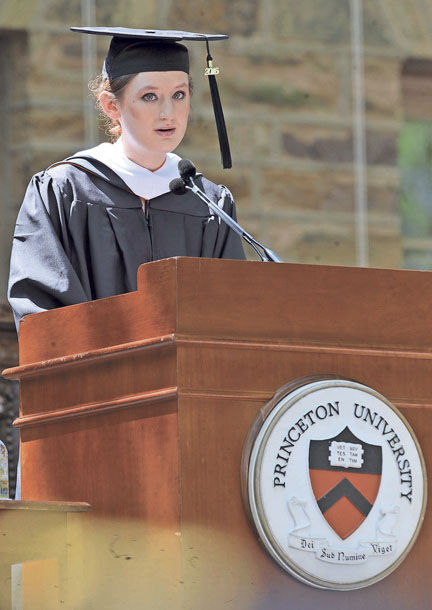By Philip Sean Curran, Staff Writer
Princeton University President Christopher L. Eisgruber on Tuesday used his annual graduation speech to call for a more civil public discourse at a time of sharp political divisions evidenced by a “shockingly coarse” race for the White House.
In a nearly 15-minute address at the 269th commencement in school history, he lamented the polarization between Republicans and Democrats.
“Americans increasingly live in what might be called ideological silos,” said Mr. Eisgruber from a platform in front of historic Nassau Hall in addressing graduates and an audience that included Gov. Chris Christie. The governor’s oldest son, Andrew, was among the 1,291 members of the class of 2016 receiving their degrees.
“Your Princeton education has provided you with the intellectual resources required not only to connect with one another but also to resist or reverse the partisanship that so threatens America and the world today,” Mr. Eisgruber said. “We need people who commit themselves to forging a public culture that enables shared, respectful and engaged discourse through which we can negotiate differences and address the urgent issues confronting us.”
He said “renewing our civic culture” would require, among other things, “a certain humanistic imagination.”
For example, he cited how the Tony Award-winning Broadway musical “Hamilton” has managed to appeal to people across the ideological spectrum. He credited the show’s creator for his interpretation of American history.
“Lin-Manuel Miranda has thus done something that neither our politicians nor our current Supreme Court seem capable of doing,” he said. “Namely, he has produced an intelligent and inspirational account of the American founding that transcends political lines.”
Mr. Eisgruber then segued into the debate that took place on campus about the legacy of former university and U.S. President Woodrow Wilson. In November, a black student group staged a sit-in of Mr. Eisgruber’s office demanding, among other things, that Mr. Wilson’s name be expunged from the public policy school and a residential college.
“We have had our own struggles with history at Princeton. We have spent a lot of time this year reckoning with Woodrow Wilson’s racism and, more broadly, with this university’s exclusionary past,” he said.
Earlier in his remarks, he said graduates enter a world that “is, in too many places, troubled and turbulent – fraught with disturbing amounts of anger, resentment and violence.”
“The world that awaits you will sometimes be frustrating and difficult. But it is a world that needs your talents, your citizenship and your engagement.”
On Tuesday, the university awarded degrees to the 1,291 undergraduates, five from former classes and 906 graduate students. The university also awarded six honorary degrees, including one to former Federal Reserve Chairman Ben Bernanke, also a former professor at Princeton.

